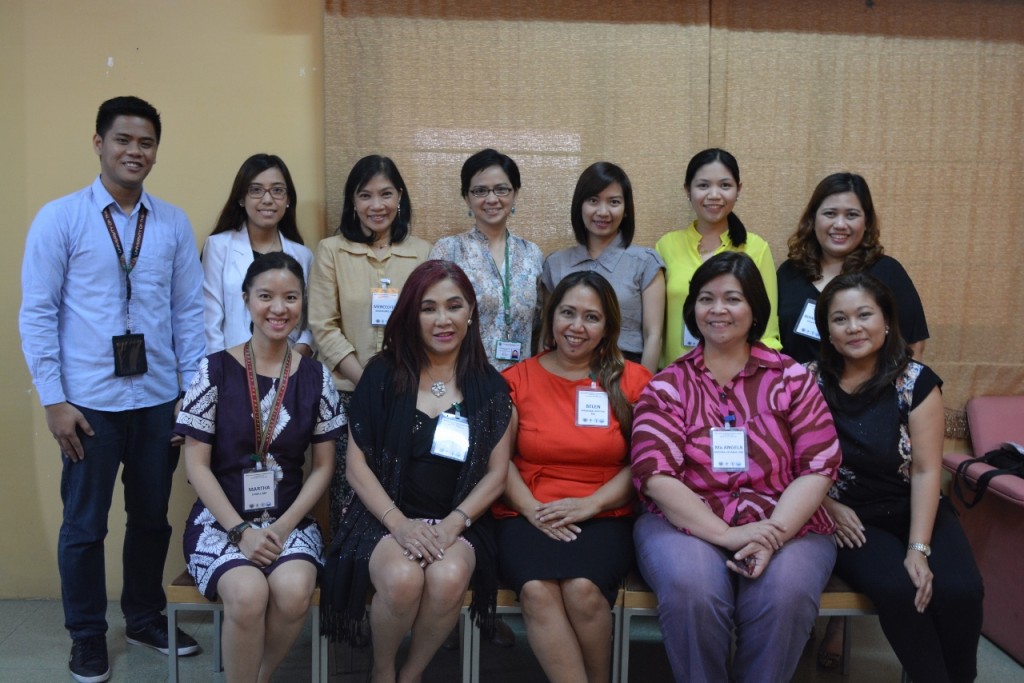PDS and NTHC collaborates, trains new specialists for Teledermatology
January 21, 2015 1:39 pm | by Henri Joshua Igna, RN | Posted in Events, News

NTHC, led by University Researcher Dr. Martha Jane Pauline Umali (first row, leftmost) and Reynaldo Gavino (second row, leftmost), conducted a short-course on eHealth and teledermatology to 11 dermatology consultants from the Philippine Dermatological Society
MANILA, PHILIPPINES – The National Telehealth Center (NTHC) under the National Institutes of Health (NIH) of University of the Philippines Manila (UP Manila), in coordination with the Leprosy Subspecialty Group of the Philippine Dermatological Society (PDS) conducted a “Short Course on eHealth and Teledermatology last November 12, 2014 at the UP Manila – Philippine General Hospital.
Eleven dermatology consultants from Philippine General Hospital (PGH), Jose Reyes Memorial Medical Center (JRMMC), Research Institute for Tropical Medicine (RITM), East Avenue Medical Center (EAMC) and St. Luke’s Medical Center (SLMC) attended the said training program as part of the initial phase of PDS Leprosy Subspecialty Group project to promote early detection and management of leprosy and other skin diseases. Dr. Ma. Teresita G. Gabriel, Chair of RITM Department of Dermatology, expressed in her opening remarks their eagerness to learn the emerging field of telehealth in the practice of dermatology.
“Since it utilizes a non-face to face clinical monitoring, patients in the rural areas will definitely benefit [from] this program,” as mentioned by Dr. Bernadette Lou G. Caluya. Teledermatology is part of the services offered by the Telemedicine Unit of the NTHC which uses SMS and email based platforms in the delivery of clinical services to far flung areas nationwide. Telemedicine is part of the project formally known as the National Telehealth Service Program (NTSP) which supports the usage of information and communication technology (ICT) to increase the accessibility of individuals from geographically isolated and disadvantaged areas to specialized clinical services, thus promoting universal healthcare. NTSP is a project of the Department of Health (DOH) in partnership with NTHC.
Dr. Martha Jane Pauline S. Umali, University Researcher of NTHC, discussed how telemedicine works and its ethico-legal implications. Various cases were provided and discussed with the participants to show the significance of ethics in the practice of telemedicine. It also served as an opportunity for the participants to discuss their concerns regarding telemedicine.
“As experts, when practitioners in rural areas encounter difficult dermatological case, I believe that’s the right time for us to come in and assist them [primary care physicians],” as mentioned by Dr. Belen Dofitas, Project Leader – Teledermatology for Leprosy Control of PDS during her discussion on the current state and practice of teledermatology in the Philippines. Dr. Dofitas also presented several local and international studies that emphasize teledermatology as a complementary way of managing skin diseases.
Participants were also taught on how to answer teleconsultations using SMS and email based platforms. The NTHC utilizes a store and forward or asynchronous type of telemedicine system, where information regarding the condition of a patient is kept in a secured system and then transmitted to a clinical specialist for analysis and vice versa. Since image is essential in the practice of teledermatology, the participants were also trained on the basics of medical photography for teledermatology. Mr. Reynaldo Gavino, Research Associate of NTHC, emphasized the significance of quality image in the practice of teledermatology since it is mainly image based. Participants have also acknowledged the need for national standards in the practice of teledermatology.
“Teledermatology is a very promising initiative,” Dr. Ma. Angela M. Lavadia, Chair of EAMC Department of Dermatology and incoming Vice President of PDS mentioned this as she affirmed their enthusiasm and willingness to support teledermatogy services and research; moreover, the participants expressed their willingness to coordinate with NTHC in achieving this agenda. The NTHC has been very open in establishing linkages to local and international community in promoting the use of ICT in the healthcare field. This collaboration between PDS and NTHC would be the start of the institutionalization of teledermatology practice in the Philippines.
Article by: Romeo Luis Macabasag, RN